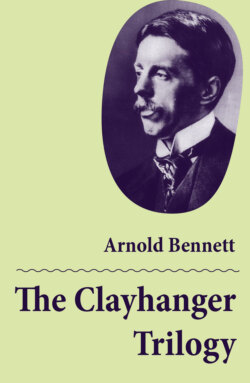Читать книгу The Clayhanger Trilogy (Consisting of Clayhanger + Hilda Lessways + These Twain) - Arnold Bennett - Страница 145
На сайте Литреса книга снята с продажи.
Three.
ОглавлениеAll that flashed through his mind and heart in a second.
“I know this old gentleman, at least I know him by sight,” Hilda was saying to the policeman. “He’s very well known in Turnhill as an old Sunday school teacher, and I’m sure he ought to be on that platform.”
Before her eye, and her precise and haughty voice, which had no trace of the local accent, the young policeman was secretly abashed, and the louts fell back sheepishly.
“Yes, he’s a friend of my father’s,—Mr Clayhanger, printer,” said Edwin, behind her.
The old man stood blinking in the glare.
The policeman, ignoring Hilda, glanced at Edwin, and touched his cap.
“His friends hadn’t ought to let him out like this, sir. Just look at him.” He sneered, and added: “I’m on point duty. If you ask me, I should say his friends ought to take him home.” He said this with a peculiar mysterious emphasis, and looked furtively at the louts for moral support in sarcasm. They encouraged him with grins.
“He must be got on to the platform, somehow,” said Hilda, and glanced at Edwin as if counting absolutely on Edwin. “That’s what he’s come for. I’m sure it means everything to him.”
“Aye!” the old man droned. “I was Super when we had to teach ’em their alphabet and give ’em a crust to start with. Many’s the man walking about in these towns i’ purple and fine raiment as I taught his letters to, and his spellings, aye, and his multiplication table,—in them days!”
“That’s all very well, miss,” said the policeman, “but who’s going to get him to the platform? He’ll be dropping in a sunstroke afore ye can say knife.”
“Can’t we?” She gazed at Edwin appealingly.
“Tak’ him into a pub!” growled the collier, audacious.
At the same moment two rosettes bustled up authoritatively. One of them was the burly Albert Benbow. For the first time Edwin was conscious of genuine pleasure at the sight of his brother-in-law. Albert was a born rosette.
“What’s all this? What’s this? What is it?” he asked sharply. “Hello! What? Mr Shushions!” He bent down and looked close at the old man. “Where you been, old gentleman?” He spoke loud in his ear. “Everybody’s been asking for you. Service is well-nigh over, but ye must come up.”
The old man did not appear to grasp the significance of Albert’s patronage. Albert turned to Edwin and winked, not only for Edwin’s benefit but for that of the policeman, who smiled in a manner that infuriated Edwin.
“Queer old stick!” Albert murmured. “No doing anything with him. He’s quarrelled with everybody at Turnhill. That’s why he wanted to come to us. And of course we weren’t going to refuse the oldest Sunday school teacher in th’ Five Towns. He’s a catch... Come along, old gentleman!”
Mr Shushions did not stir.
“Now, Mr Shushions,” Hilda persuaded him in a voice exquisitely mild, and with a lovely gesture she bent over him. “Let these gentlemen take you up to the platform. That’s what you’ve come for, you know.”
The transformation in her amazed Edwin, who could see the tears in her eyes. The tableau of the little, silly old man looking up, and Hilda looking down at him, with her lips parted in a heavenly invitation, and one gloved hand caressing his greenish-black shoulder and the other mechanically holding the parasol aloft,—this tableau was imprinted for ever on Edwin’s mind. It was a vision blended in an instant and in an instant dissolved, but for Edwin it remained one of the epochal things of his experience.
Hilda gave Edwin her parasol and quickly fastened Mr Shushions’s collar, and the old man consented to be led off between the two rosettes. The bands were playing the Austrian hymn.
“Like to come up with your young lady friend?” Albert whispered to Edwin importantly as he went.
“Oh no, thanks.” Edwin hurriedly smiled.
“Now, old gentleman,” he could hear Albert adjuring Mr Shushions, and he could see him broadly winking to the other rosettes and embracing the yielding crowd in his wink.
Thus was the doddering old fool who had given his youth to Sunday schools when Sunday schools were not patronised by princes, archbishops, and lord mayors, when Sunday schools were the scorn of the intelligent, and had sometimes to be held in public-houses for lack of better accommodation,—thus was he taken off for a show and a museum curiosity by indulgent and shallow Samaritans who had not even the wit to guess that he had sown what they were reaping. And Darius Clayhanger stood oblivious at a high window of the sacred Bank. And Edwin, who, all unconscious, owed the very fact of his existence to the doting imbecile, regarded him chiefly as a figure in a tableau, as the chance instrument of a woman’s beautiful revelation. Mr Shushions’s sole crime against society was that he had forgotten to die.
